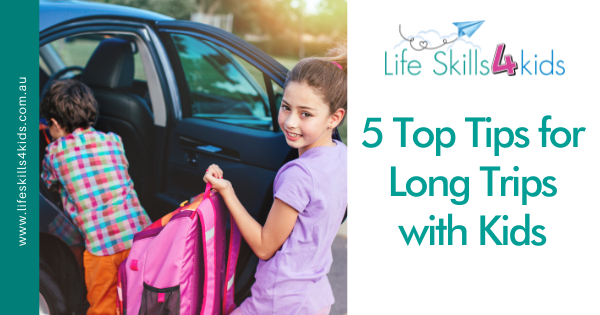Keeping you sane during long trips!!
School holidays often equate to travelling long distances and often carry high expectations for family fun, bonding and memories. But, often as we turn the key in the car and the kilometres tick by, so too do our precious children turn on their keys of sibling rivalry and the back seat can accelerate into a mess of poking, whining and complaining. Suddenly the family holiday has lost its glow. How can you cope better with long trips?
What we all envisage as we load into the car is a holiday of happy and fun memories. So, how do we start the holiday off right and cruise into an awesome holiday? Wouldn’t it be great to arrive at our destination with a car load of happier children rather than a war zone emptying from the back seat.

5 top tips for long car trips to keep you sane this holiday season.
- Involve your children in the planning. When children have a solid understanding of where you are going, how long you are there, what you will be doing, they will feel psychologically safe. Before the rush of packing the car (perhaps the weekend before), help them make a little ‘holiday book’ (fold over some A4 paper and staple down the side – keep it simple). In this book, create a weekly calendar grid and write in the main activities for each day that you are away. Draw a picture underneath for younger children or children who struggle with reading so they understand what is happening on each day. The rest of the book can be used for pasting in brochures, stickers or other memorabilia collected during the holiday.
- In the car, encourage your children to use their ‘holiday book’. Create a front page for their book, and start decorating some of the pages. Have some blank pages for each of the long drives and get them to draw things they see on the way. You can count red cars or trucks for example. This book can become a great memory book of what they did while away.
- Limit screen time. Often iPads, phones or watching movies in the car is an easy way to occupy children and have a peaceful car. However, use this as a last resort and create ‘screen-free time’ during trips. It will help your child’s behaviour and their long term brain development. Don’t give in too quickly. Screen time disconnects families. Car trips are an opportunity to connect with your children. Try other alternatives for entertainment and for passing the time. Encourage your child to look out the window and explore the scenery visually. Actively point out interesting scenery, animals or bridges and talk about their features. Encourage them to write or draw interesting observations on the way. Ask questions. Be communicative about what you see. Make the most of the quality time together.
- Listen to an audio book. Using audio books rather than watching DVDs stimulates children’s imaginations, and allows them to pass the time while still looking out and engaging with their environment around them. There are many fun audio books available these days. Download on an app or loan from your local library.
- Keep those fidgeting fingers busy. Busy brains and busy fingers equal a happier car. To divert the inevitable poke and prodding or leaning on siblings, pack some fidget toys to keep little fingers busy. Visit your local $2 bargain shop and stock up on pipe-cleaners and crafty supplies that can be used in the back seat without too much mess.
Summer road trips with the family are a classic Australian holiday. But scorching heat, tight spaces and bickering siblings can spell disaster in a matter of seconds. Before you embark on your next long car ride make sure you’ve ticked all these boxes first.
Read more about Surviving Long Car Trips with Kids
Get your own copy!
Kids today are growing up in a fast-paced world where information and opportunity overload can be overwhelming.
Based on many years of clinical experience as an Occupational Therapist, Deb Hopper has been using her Just Right Kids® Model to teach children to communicate and manage their stress and anxiety by:
- Identifying their “body speed”,
- Understanding their stress triggers, and
- Implementing simple strategies to reduce anxiety and stress.
Grab a hold of strategies that support the body and decreases the emotional reaction of anxiety through
- Physical/ body strategies
- Cognitive/ thinking strategies
- Understanding the power of planning in decreasing anxiety in children.



Trackbacks/Pingbacks